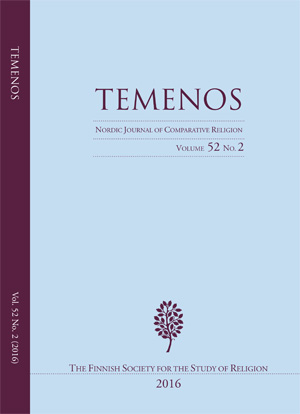The knowledge of disembodied souls: Epistemology, body, and social embeddedness in the eschatological doctrine of later sixteenth-century German Lutherans
DOI:
https://doi.org/10.33356/temenos.60303Keywords:
16th century, Lutheranism, resurrection, epistemology, departed soulsAbstract
In the wake of their rejection of purgatory Protestants had to rethink their eschatological views. The German Lutherans of the latter half of the sixteenth century developed a robust doctrine of the last things, including a teaching on what departed souls know prior to the resurrection. Following an overview of the sources and a brief reconstruction of the overall locus, this article focuses on an analysis of what and how disembodied souls are claimed to know. The evidence holds some surprises. First, while more than lip-service is certainly paid to the ways of knowing God, the authors’ real interest lies in the exploration of interpersonal relationships. Their primary concern is how other human beings, whether still on earth or already departed, may be known and what may be known about them. The implications are threefold. Knowledge of God and knowledge of human beings—ultimately, knowledge of self—are intertwined. Anthropology takes centre-stage, and ontology is thus superseded by epistemology. In all this, the body is never relinquished. The apparently unconscious importation of sensory language and conceptualisation of sense-based experience permeate the discussion of ostensibly disembodied knowledge. Knowing, for our authors, is ultimately a function of the body even if this means ‘packing’ bodily functions into the soul. In this doctrine, which may have had its roots in patristics but which has also demonstrably absorbed impulses from popular religion, knowledge of God is not only deeply connected with individual identity but also exhibits indelible social features and is inseparable from the (re)constitution of community.Downloads
Published
How to Cite
Issue
Section
License
Copyright (c) 2016 Temenos - Nordic Journal of Comparative Religion

This work is licensed under a Creative Commons Attribution-NonCommercial-NoDerivatives 3.0 Unported License.
Author's Guarantee
- The Author acknowledges that the Work will be publicly accessible on the Internet and that such access will be free of charge for the readers.
- The Author guarantees that the Work is her/his original work that has not been published before and cannot be construed as copying or plagiarism. Furthermore, the Author confirms that the Work contains no statement that is unlawful, defamatory or abusive or in any way infringes the rights of others.
- The Author confirms that she/he has secured all written permissions needed for the reproduction in the Publication of any material created by a third party.
User Rights
Under the CC BY 4.0 license, the Author/s and users are free to:
- Share — copy and redistribute the material in any medium or format,
- Adapt — remix, transform, and build upon the material for any purpose, even commercially,
- However, the Work must be attributed to the original Author and source of publication.
The license of the published metadata is Creative Commons CCO 1.0 Universal (CC0 1.0)
Author Rights
The Authors maintain the right to:
- copyright, and other proprietary rights relating to the Work,
- the right to use the substance of the Work in future own works,
- the right to self-archiving/parallel publishing (publisher's PDF allowed).
Rights of Publisher
- The Publisher reserves the right to make such editorial changes as may be necessary to make the Work suitable for publication in the publication, e.g. style of punctuation, spelling, headings and the like.
- The Publisher will publish the Work if the editorial process is successfully completed and reserves the right not to proceed with publication for whatever reason.
- The publication entitles the author to no royalties or other fees. This agreement will be governed by the laws of Finland.






